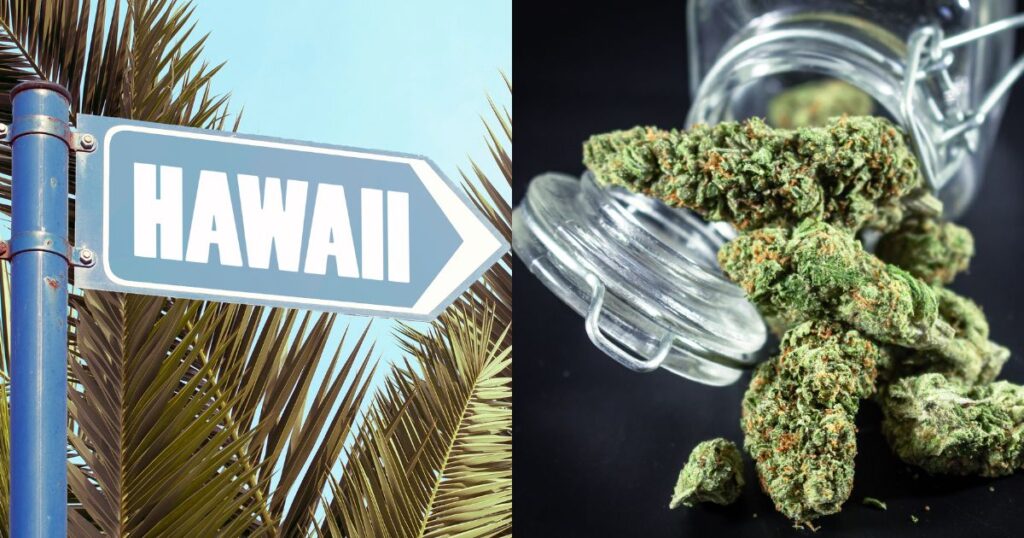Hawaii is once again attempting to legalize cannabis for recreational use with companion bills HB1246 and SB1613. These bills set out to establish a framework for recreational marijuana use in the state while addressing concerns around regulation, public safety, and economic growth. The Committee on the Judiciary and Hawaiian Affairs and Agriculture will hear House Bill 1246 today. If eventually passed, the measures will mark a big shift in Hawaii’s approach to cannabis cultivation, sales, and usage. Here’s what you need to know about the bills and their potential impact.
What Do HB1246 and SB1613 Propose?
The centerpiece of Hawaii’s latest cannabis reform effort is the creation of the Hawaii Cannabis and Hemp Office under the Department of Commerce and Consumer Affairs, which would oversee all aspects of the cannabis plant and its derivatives, unifying the regulation of the adult-use cannabis, medical marijuana, and hemp industries under one umbrella. The legislation outlines a timeline for implementation, with the legal sale and use of marijuana set to begin on January 1, 2026, if passed.
One of the components of these bills is the legalization of adult personal use. Adults aged 21 and older would be allowed to possess up to one ounce of marijuana or five grams of marijuana concentrate. Additionally, adults could cultivate cannabis at home, growing up to six plants for personal use, with a maximum of 10 plants and two pounds of cannabis per household.
The bills also propose taxes on retail cannabis sales. Adult recreational cannabis sales would carry a 14% tax, while medical cannabis sales would remain taxed at 4%. Revenue from these taxes would contribute to a broad array of programs, including grants for public health, education, social equity, and public safety.
Addressing Public Concerns of Hawaii Recreational Marijuana in Proposals
Rep. David Tarnas and Sen. Joy San Buenaventura, respective chairs of the House Judiciary and Hawaiian Affairs Committee and Senate Health and Human Services Committee, authored the bills. Both lawmakers have discussed their efforts in crafting legislation that balances progressive cannabis policies with public health and safety measures.
One major challenge the lawmakers hope to tackle is concerns from law enforcement, a hurdle that derailed prior legalization efforts. By including detailed protections around DUI offenses and public consumption, the bills aim to accommodate objections raised by opponents in previous sessions. For instance, marijuana smoking in public spaces would result in civil penalties, while fines or community service would be enforced for open cannabis containers found in vehicles.
Tarnas highlights the efforts to incorporate lessons learned from other states. “We’ve tried to include best practices… and have been in close consultation with the office of the attorney general to address public health and safety concerns while supporting a viable cannabis industry,” he explained via West Hawaii Today.
Why 2026? The Long-Term Vision
Although Hawaii’s legislators support moving toward legalization, the timeline for implementation—January 1, 2026—reflects a phased rollout approach to ensure proper systems are in place. Interim rules are expected by December 31, 2025, with final regulations slated for completion by December 31, 2030.
The phased rollout addresses concerns over regulation, consumer education, and industry readiness. It also provides a window for state agencies to prepare licensing systems, establish robust enforcement mechanisms, and ensure the Hawaii Cannabis and Hemp Office is sufficiently staffed and equipped to oversee the industry.
Economic Opportunities and Equity Components
One of the most compelling arguments in favor of legalization is its economic potential. Estimates suggest recreational cannabis could generate between $30 million and $100 million in annual net revenue for Hawaii. Much of this revenue would be reinvested into programs focused on health, public safety, and equity.
A social equity grants program is a central feature of both bills. Designed to redress the disproportionate impacts of the war on drugs, the program would allocate funds to businesses and individuals from historically disadvantaged communities. Grants would cover technical assistance, training, and financial support for small businesses and Indigenous farmers.
New revenue streams would also benefit Hawaii’s counties, the attorney general’s office, and community-based organizations tackling issues like youth education and substance abuse prevention.
Learning From Past Attempts to Legalize Recreational Marijuana in Hawaii
Past attempts to legalize recreational marijuana in Hawaii have stalled within the legislature. Key votes failed to secure enough support in prior sessions, including a last-minute bottleneck in the House last year. Will this time be different? Advocates are cautiously optimistic.
Rep. Chris Todd, a co-sponsor of HB1246, emphasized the bill’s potential via the West Hawaii Today as a “significant revenue generator” for the state. He also noted the fine balance lawmakers must strike when setting tax rates. Taxes that are too high risk fostering a black market, while taxes that are too low could fail to provide the financial benefits legalization promises.
This revamped effort to legalize marijuana has garnered support from prominent Democratic lawmakers, but the final outcome remains uncertain. With floor votes expected to be narrow, proponents are working to craft the strongest possible bill to win over undecided lawmakers.
Public Sentiment and the National Context
Hawaii’s push to legalize recreational marijuana comes as 23 other states and the District of Columbia have already embraced adult-use cannabis policies. Public sentiment in Hawaii appears to lean in favor of these reforms, thanks in part to growing awareness of the economic and social benefits seen in states like California, Colorado, and Oregon.
However, lawmakers still face critical questions. Law enforcement concerns, the regulation of synthetic cannabinoids, and ensuring fair access to licenses present challenges lawmakers must address as the bills progress through the legislature.
What’s Next?
The Judiciary and Hawaiian Affairs and Agriculture Committees will hold the first hearing for HB1246 and the push for recreational marijuana in Hawaii today at 2 p.m. Meanwhile, the Senate Health and Human Services and Judiciary Committees are still reviewing a companion bill, SB1613, but have not scheduled a hearing yet.
It’s clear that the road to legalization in Hawaii is far from over, but this year’s proposal marks a decisive step forward. With its approach to taxation, public safety, and social equity, the current legislation has the potential to transform Hawaii’s cannabis landscape.
















